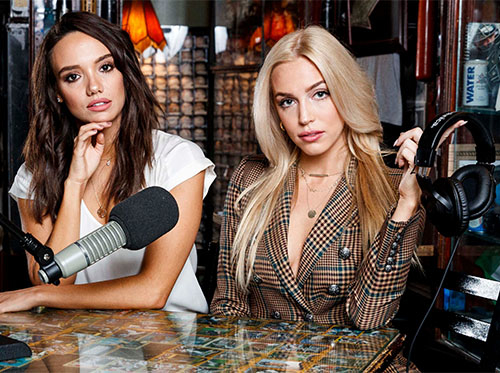What Does Joe Rogan’s Exclusive Spotify Deal Signal for the Future of Podcasting?
This morning Spotify announced an exclusive licensing deal for the Joe Rogan Experience (“JRE”) podcast. Starting sometime after September 1 2020, the world’s most downloaded and widely distributed podcast will only be available on Spotify.
It’s a landmark deal. Spotify’s stock price rose 4% on the news, and is up 9% for the day as of this writing.
The partnership also raises big questions and signals the future of podcasting.
The angle for Joe Rogan?
There’s no announcement of an expanded Joe Rogan podcast network that Spotify will invest in and help build. Rogan already makes a lot of money, speculated at $30M per year on his podcast alone. He reaches a massive audience on numerous platforms (his website, YouTube, Apple Podcasts and other podcatchers).
So what’s the angle?
Rogan is NOT on Spotify. And maybe he believes he needs to be.
Spotify has the fastest growing audience of audio listeners, with podcasts driving much of that growth. Joe could thus be making a huge bet on the future of audio. Aligning himself with the fastest growing audience platform.
Joe cares a lot about his listeners, so restricting access to a free yet closed (users still have to sign up for Spotify and share their data) platform is a BIG decision. He needs to see his listeners benefit. To that end, does Rogan believe that Spotify will deliver the most premium consumption experience around his podcasts (which will also help drive new audience his way)? Providing delight beyond listening via “vodcasts“, discoverability, and more? All while allowing Rogan to access as many listeners as possible, and continue to be a powerful “gateway” for driving more podcast consumption overall?
That idea sounds great. Because when listeners win, the whole industry wins. Creators, platforms, back office teams, advertisers, et al.
But yes, there’s also likely a lot of deal money involved (we speculate at up to low 9 figures).
The deal terms, while undisclosed, likely provide Rogan a large minimum guarantee of earnings during the partnership term. And, he can still control and earn from his host read ads. With uncertainty in listener behavior and massive advertiser market downturn during COVID-19, Joe’s team may have been attracted to certainty in future cash flows.
Will Rogan use these large payments to fund other enterprise value-building initiatives? We haven’t seen any past intention from him to do so, and there’s no mention of it in the press release. It seems unlikely. But, based on all the big M&A news around talent podcast networks (The Ringer, Barstool Sports), we’re sure the idea has been floated by his team multiple times…
The power of BIG talent.
As we’ve written about before, big talent personalities drive audience, engagement, and enterprise value. It explains the recent star producer and showrunner deals by Netflix, HBO Max, Peacock, who are competing in the video “streaming wars”. It also explains Microsoft Mixer’s exclusive deal for Ninja, recruiting him away from Twitch. And don’t forget SiriusXM’s $500M exclusive 12 year deal for Howard Stern back in 2015.
Big talent deals are not new in media, are definitely not new in audio, and more large audio talent deals will follow.
Spotify has ramped up its own exclusive talent deals with Barack Obama’s Higher Ground Productions, Joe Budden, Amy Schumer, and The Last Podcast on the Left.
But with JRE, a whole new precedent has been set for podcasting talent deals.
Will small creators feel left out?
More capital is flowing into podcasting from venture investors and big traditional media. High-profile celebrities are increasingly entering the podcasting fray.
Will smaller and mid-sized podcasters be able to build sustainable businesses into the new order? Will they be able to attract investment to effectively compete and scale? Will fast-growing podcast ad dollars still flow to long tail creators, or will ad spend continuously migrate to the largest shows (an existing trend)?
Overall, do small and mid sized creators matter? The answer depends on where you’re standing.
Re Spotify, their moves indicate they support long tail creators. Hence the 8-figure purchase of UGC podcasting platform Anchor.fm and the Spotify for Creators toolkit that provides podcasters tools and a suite of data to help them build audience and program on Spotify.
But, we at RockWater are big believers of 80 / 20 (it’s one of our values on our website). The biggest moves have an outsized impact, and the JRE deal is a major growth move. Data from YouTube shows that its largest and most elite creators deliver massively outsized viewership. The same math applies for Spotify.
Is supporting the full creator spectrum good for PR? Yes.
Is it good to be the go-to destination for creators of all sizes, which includes incubating future stars? Yes.
Is supporting all creators and voices the right thing to do in media? Yes.
Is building for small and mid sized creators a riskier bet (in terms of building enterprise value and driving ROI for Wall Street investors) than paying up for the most premium talent?
Yes. The stock price bump signals Wall Street’s agreement.
Large user acquisition and retention boost for Spotify.
Rogan’s podcast is estimated at 190M+ downloads per month across all platforms and devices. All that content will now come down except for some supplemental content on YouTube. Joe’s listeners and fans will be directed solely to Spotify.
That’s a lot of audience. We don’t have data on what % of that audience is additive to Spotify’s user base, but it must be meaningful for Spotify to enter into what was likely a high 8 to low 9-figure deal.
Yet another large price tag on top of $500M of podcast M&A 2019, other talent exclusivity signings, new initiatives like Spotify Kids, and more.
Like the video streaming wars, we believe few audio platforms will win big. Now is the time to grow audience and content supply as fast as possible. Spotify is investing aggressively to ensure it’s at the top of the winner’s list.
Also of note, JRE is the most searched for show on Spotify. The audio streamer wins by delighting its users and giving them what they want. And the users want Joe Rogan. User retention will improve within the free tier. And with better retention, there is more opportunity for free to paid conversion.
Which means more recurring revenue, the ultimate goal.
Will it help Spotify gain new users from YouTube?
As of early May, Spotify users can access studio-based video recordings, or vodcasts, in the app for select podcasts. Per the press release, Joe Rogan’s videos will also be added.
Currently, many creators publish videos of their podcasts on YouTube. It’s a popular move due to the wide audience access and monetization via AdSense (JRE has 8M+ YouTube subs and earns millions of views per video upload). Also, millions of YouTube users consume music videos by putting on a Vevo playlist and putting their phones in their pocket.
We’re sure Spotify observed this YouTube behavior, seeing how audio fans consume video content, and knew it needed to enhance its audio product and UX to again…delight its users and grow its audience.
Will Spotify video attract other podcasters who believe a native “vodcast” product is an important enhancement to their listener experience? (Read more about video angles for audio in our article about SiriusXM video.) Will Joe Rogan’s “future of audio” bet give other podcasters the confidence / desire to make the shift to a closed, but potentially more premium, audio-focused platform? How much audience will migrate from YouTube, one of the world’s largest audio listener platforms on the planet, and when? Will YouTube respond?
—
Ping us here at anytime. We love to hear from our readers.



